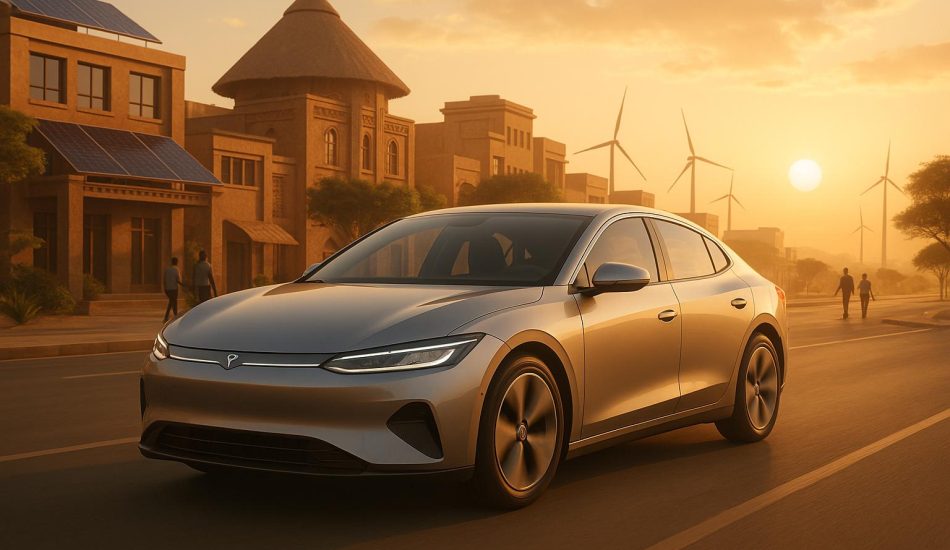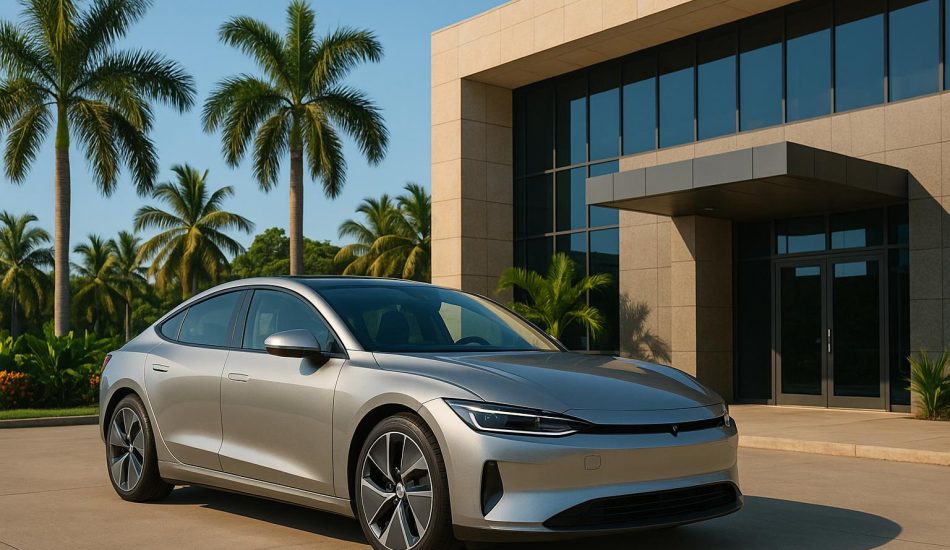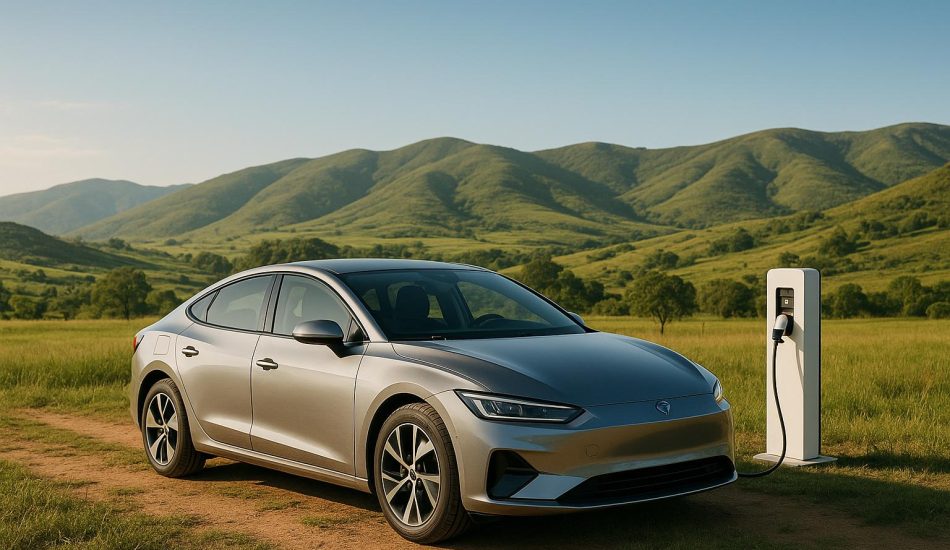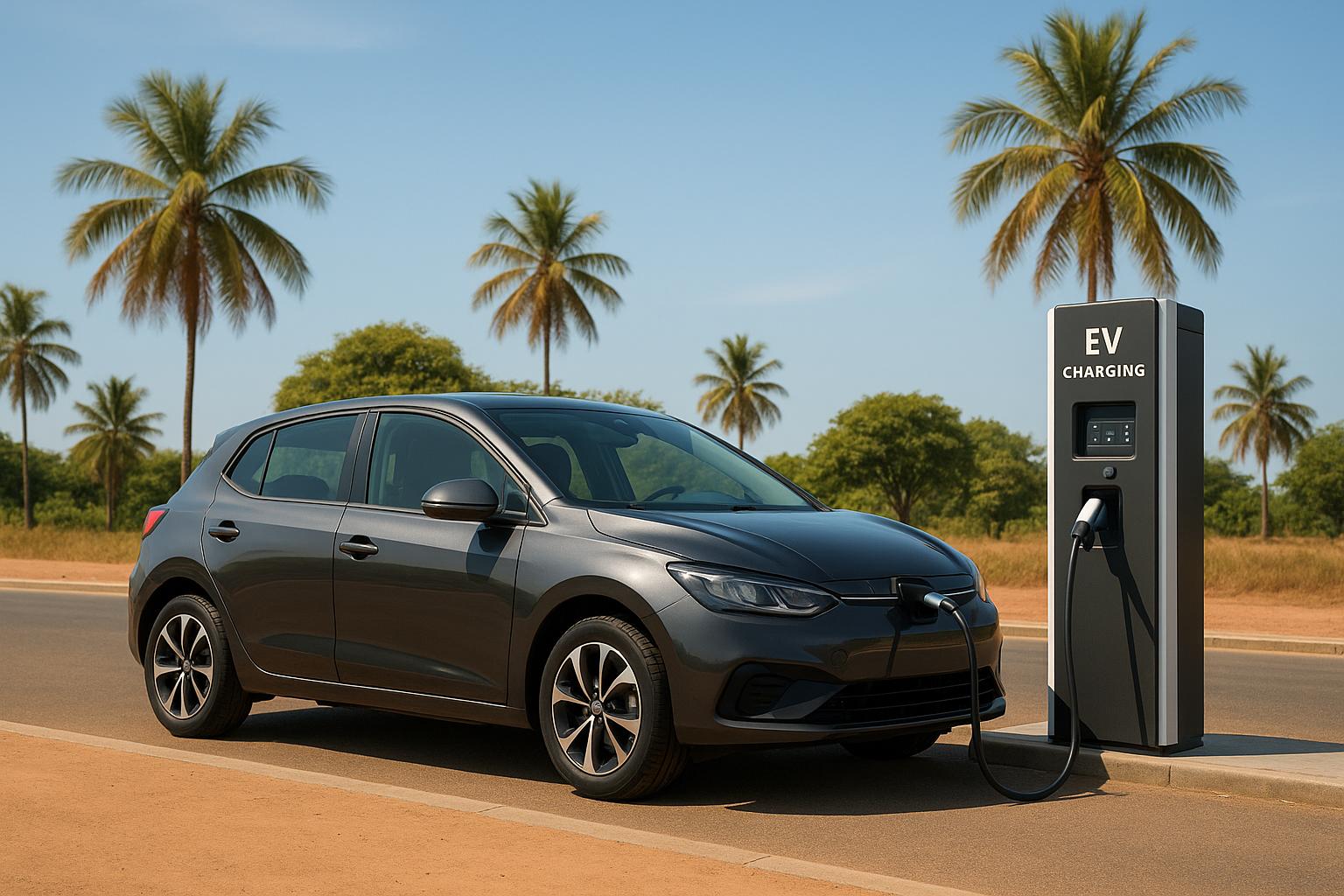
Gambia is embracing electric vehicles (EVs) as a solution to reduce emissions and save on fuel costs. With government incentives, lower maintenance expenses, and growing renewable energy projects, EVs are becoming an attractive option for Gambians. Here’s what you need to know:
- Buying Options: Purchase EVs locally through verified dealerships like TK Motors or online platforms like EV24.africa. Local options offer quicker delivery and warranty support, while importing may provide lower upfront costs but includes additional taxes and longer wait times.
- Key Costs: Import duties (25%), excise taxes (20%), and VAT (16%) apply to imported EVs unless exempt. Shipping costs range from $2,015 to $3,029, with local fees between $1,500 and $2,500.
- Import Process: Platforms like EV24.africa simplify importing with services like customs clearance and delivery. Required documents include invoices, inspection certificates, and import declarations.
- Legal Rules: EVs must be under 8 years old, left-hand drive, and meet safety standards. Registration involves customs clearance and local inspections.
- Charging Infrastructure: Tools like PlugShare and ChargeFinder help locate charging stations, with expansion efforts in urban areas like Serekunda.
Whether buying locally or importing, understanding costs, regulations, and support options will help ensure a smooth transition to EV ownership.
First Electric Car Company in The Gambia – Buxin Electronics
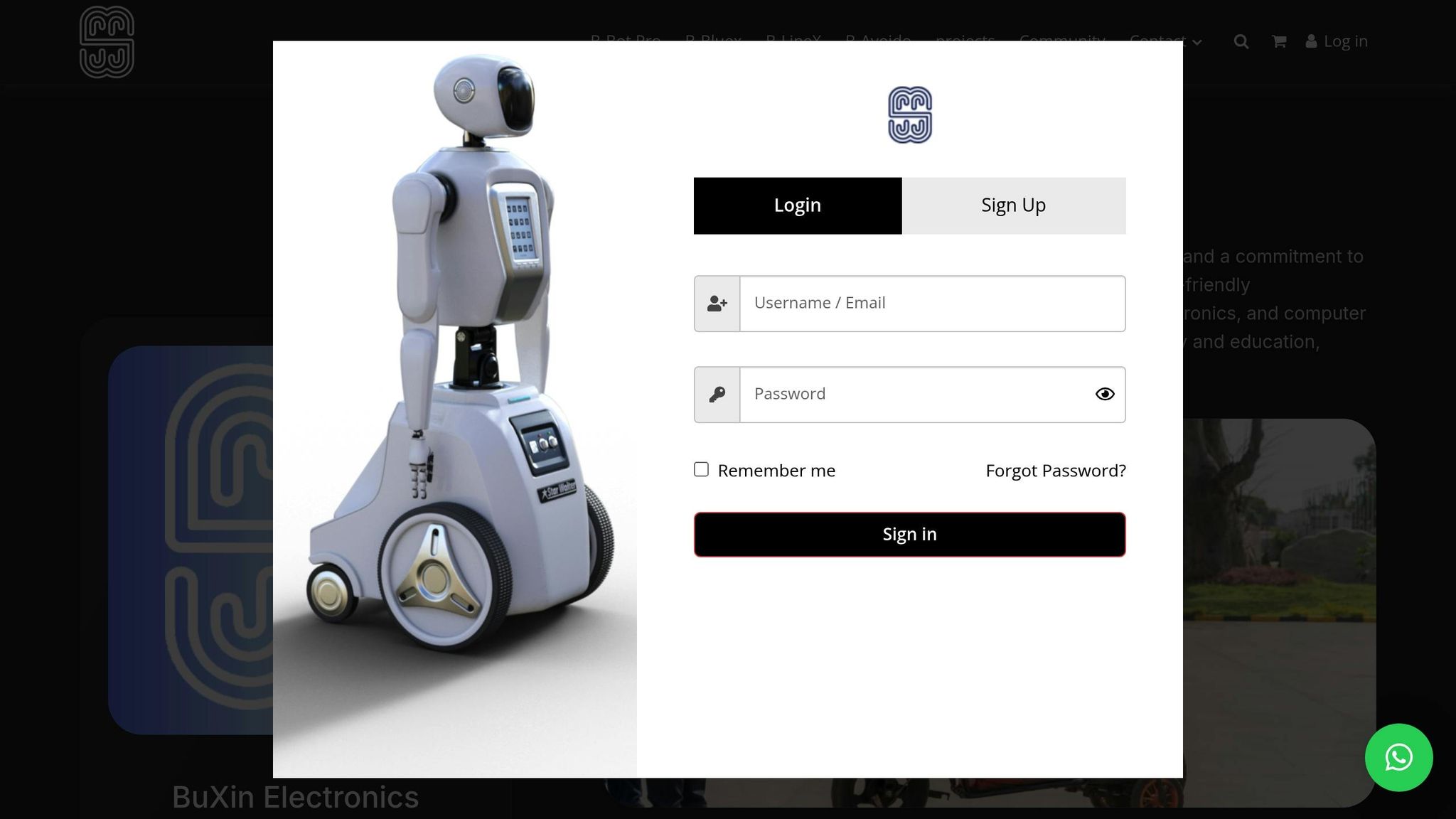
Where to Buy Electric Vehicles in Gambia
If you’re looking to buy an electric vehicle (EV) in Gambia, you’ll need to explore both local and online options. Each has its own perks, so understanding the differences can help you make the right choice.
Online Platforms for EV Purchases
One of the top online marketplaces for EVs in Africa is EV24.africa. This platform offers a variety of new and used electric vehicles, featuring well-known brands like Tesla, BYD, Leapmotor, ROX, Dongfeng, Geely, Hyundai, Toyota, and Suzuki. Whether you’re after a cutting-edge Tesla or a more budget-friendly model, EV24.africa has options to suit different needs and budgets.
What sets EV24.africa apart is its end-to-end service. They handle the entire import process under international commercial terms (Incoterms), making it easier for Gambian buyers to navigate the complexities of importing a vehicle. With a team of over 200 professionals spread across five African countries and partnerships in more than 40 nations, the platform ensures a smooth experience for buyers.
They also provide transparent pricing, detailed vehicle specs, and financing options tailored to the African market. You can browse listings, compare models, and even get expert guidance on selecting the right vehicle and understanding the import process.
How to Check Dealerships and Sellers
When buying locally, it’s essential to verify the credibility of dealerships and sellers. In Gambia, the Public Utilities Regulatory Authority (PURA) oversees the regulation of equipment vendors, including EV sellers. This means any dealership selling EVs should have proper licensing and meet PURA’s standards.
Before purchasing, ask the dealer for proof of licensing and ensure the vehicle has received type approval from PURA. This approval confirms the vehicle is compatible with the country’s networks and regulations. For added peace of mind, you can contact PURA directly. Their office is located at 94 Kairaba Avenue, KMC, The Gambia, and they can be reached at +220 4399601 or via email at [email protected].
If you’re leaning toward established dealerships, TK Motors Company Limited is worth considering. They are an authorized dealer for Hyundai and Mitsubishi in Gambia, offering after-sales services and warranty support. This can be a major advantage if you want reliable service and parts availability close to home.
When evaluating any seller, check customer reviews, verify their business registration, and confirm their ability to provide all necessary documentation for vehicle registration. These steps are key to ensuring a smooth buying experience.
Local vs. Imported EVs: What to Consider
Deciding between a locally available EV and an imported one boils down to factors like cost, delivery time, and long-term support.
Imported EVs often come with a lower base price due to global competition, but the added costs of import duties, excise taxes, and VAT can significantly increase the final price. For example, import duties alone are 25% of the vehicle’s CIF value, with an additional 20% excise duty and 16% VAT. On the other hand, local EVs may have higher upfront prices due to limited supply and dealer markups, but they avoid these extra import-related expenses.
Delivery time is another key difference. Locally available EVs can usually be delivered within a few weeks, while imported vehicles often take several months due to shipping and customs clearance processes.
Warranty and service support are perhaps the most critical considerations. Local dealerships, like TK Motors, provide immediate access to warranty services and spare parts, which can save you time and money in the long run. Imported EVs, however, may come with limited or no warranty coverage in Gambia, making repairs more challenging and expensive.
Here’s a quick comparison:
| Factor | Local EVs | Imported Options |
|---|---|---|
| Total Cost | Higher base price, no import duties | Lower base price + 25% import duty + 20% excise + 16% VAT |
| Delivery Time | 1-4 weeks | 2-4 months |
| Warranty Coverage | Local warranty support available | Limited or invalid warranty coverage |
| Service Access | Immediate access to authorized service centers | Limited specialized service options |
| Parts Availability | Faster parts sourcing through local dealers | Longer wait times for specialized EV parts |
If you prioritize quick delivery and reliable support, a local EV might be the better choice. But if you’re after a broader selection and possibly lower upfront costs, importing could be worth considering. Just make sure to factor in the total ownership costs, including potential repair expenses and parts availability, to make an informed decision.
How to Import EVs into Gambia
Bringing an electric vehicle (EV) into Gambia is made easier thanks to government tax exemptions on fully electric cars, which waive VAT and customs duties. Here’s a step-by-step guide to help you navigate the process.
Finding and Choosing an EV
Start by selecting an EV that fits your budget and needs. Platforms like EV24.africa offer a variety of options, including detailed specifications, pricing, and financing plans.
When deciding, consider key factors such as battery range, charging compatibility, and the availability of maintenance services in Gambia. Popular models like the Tesla Model 3, BYD sedans, and Hyundai electric vehicles are known for their dependability and performance.
Don’t forget to factor in additional costs like shipping, insurance, and any customs-related fees. Both new and used EVs are available, with used models often providing better value while still benefiting from tax exemptions.
Once you’ve made your choice, gather the necessary documents to proceed with the import.
Required Documents and Payment
To import your EV, you’ll need to prepare several documents, including:
- General import documents: Import declaration, invoice, bill of lading, certificate of origin, packing list, and certificate of inspection. You’ll also need your Tax Identification Number (TIN).
- Vehicle-specific documents: Purchase invoice, original bill of lading, certificate of ownership (showing chassis number, year, model, and engine number), legal conveyance certificate, original commercial invoice, import declaration form from customs, the original logbook from the country of origin, and an international insurance policy.
An inspection certificate is a must. This document, either original or certified, must come from the country of origin and verify the vehicle’s condition before import.
For payment, EV24.africa provides two options: Delivered Duty Paid (DDP), where all costs are covered upfront, or Free on Board (FOB), which requires you to handle additional costs like shipping and customs.
With your documents and payment sorted, the next step is customs clearance.
Customs Process and Final Delivery
The customs process begins at the Port of Banjul. To streamline this step, hire a clearing agent who can handle the electronic processing of your documents through the ASYCUDA System.
An Import Declaration Fee (IDF) of 2.25% of the CIF (Cost, Insurance, and Freight) value applies, with a minimum fee of D5,000. Thanks to government tax exemptions, the cost of importing an EV is significantly lower than that of traditional vehicles.
EV24.africa supports you through customs clearance and registration. They also handle any applicable import taxes and offer two shipping methods: RoRo (Roll-on/Roll-off) and Container shipping. Delivery options include port-to-port or door-to-door services.
Keep in mind that imported EVs must be left-hand drive and less than 8 years old.
For final delivery, door-to-door service ensures your EV is transported from the port to your specified location, while port-to-port delivery requires you to arrange local transportation. Following these steps will ensure your EV arrives efficiently and with minimal hassle.
Legal Rules for EV Imports in Gambia
Once you’ve navigated the import process, the next step is understanding Gambia’s legal requirements for purchasing and registering your EV. These rules are essential to ensure your vehicle complies with local regulations from shipment to registration.
Vehicle Age and Emission Rules
Gambian law mandates that imported EVs must be less than 8 years old, regardless of their condition or mileage. Because of this, verifying the manufacturing year before making a purchase is a must. Additionally, vehicles with right-hand drive are generally not allowed unless they serve a specific purpose.
While EVs don’t produce tailpipe emissions, they still need to meet Gambia’s safety and certification standards. In some cases, emissions testing may also apply. To stay informed on the latest requirements, it’s a good idea to consult Gambian customs authorities or work with a licensed customs broker.
Vehicle Registration and Permits
After clearing customs, the registration process kicks off with specific documentation and inspections. Importers must prepare an import declaration form in triplicate and submit it to Customs, a practice outlined in 2022 regulations.
For used vehicles, an inspection is mandatory before importation. You’ll need to provide an original or certified copy of the inspection certificate from the country of origin to confirm the vehicle meets safety standards. Along with this, you’re required to submit standard import documents, including the purchase invoice, bill of lading, certificate of origin, and inspection certificate. Additionally, items like your driver’s license and an international insurance policy may be necessary.
Once customs clearance is complete and your EV has arrived, you can finalize the local registration through the appropriate Gambian transportation authorities.
sbb-itb-99e19e3
Tips and Resources for EV Buyers
Purchasing and importing an electric vehicle (EV) to Gambia involves more than just picking a car – it requires careful budgeting, understanding import regulations, and planning for long-term ownership. Below are some practical tips and resources to help you make informed decisions and manage costs effectively.
Budget Planning and Total Costs
Before you commit to buying an EV, it’s essential to understand the full scope of expenses involved. The vehicle’s price is just the beginning – shipping, import duties, and local fees can significantly inflate the overall cost.
Shipping an EV from the USA to Gambia typically costs between $2,015 and $2,715, with an average range of $2,062 to $3,029 depending on factors like vehicle size, shipping method, and seasonal demand. On top of that, import costs such as a 1.55% processing fee and a 1% ECOWAS levy applied to the CIF (Cost, Insurance, and Freight) value of the vehicle can add to your expenses.
Once the vehicle arrives in Gambia, local fees can range from $1,500 to $2,500. Additionally, Gambian regulations restrict imported vehicles to those under eight years old, which may mean higher upfront costs for newer models that comply with this rule. Keep in mind that right-hand drive vehicles are generally prohibited unless they serve a specific purpose, potentially limiting your choices and affecting prices.
Payment and Financing Options
To make EV ownership more accessible, platforms like EV24.africa offer a variety of financing solutions. These options allow you to spread the cost over time, making it easier to fit an EV purchase into your budget.
- Unsecured Personal Loans: Based on your credit score, income, and borrowing history, these loans let you own the vehicle outright from the start.
- Secured Loans: These loans use your home as collateral and can offer higher borrowing limits and longer repayment periods.
- Hire Purchase Agreements: With this option, you make higher monthly payments but pay a small fee at the end to take full ownership of the car.
- Personal Contract Purchase (PCP): This structure features lower monthly payments but may require a larger "balloon payment" if you decide to buy the car outright at the end of the term.
- Car Leasing: Leasing offers the lowest monthly payments but does not include ownership rights.
Lenders typically consider factors like loan amount, income, credit history, and debt-to-income ratio when determining eligibility. Be sure to shop around and compare interest rates, loan terms, and total repayment costs to find the best deal. Additionally, check for government programs or incentives that may help offset initial expenses or provide favorable financing terms.
Service Centers and Charging Stations
For long-term EV ownership, access to reliable service centers and charging infrastructure is essential. Platforms like PlugShare provide a detailed map of charging stations in Gambia, using a color-coded system to indicate their status: green for public Level 1-2 chargers, orange for high-power fast chargers, brown for restricted locations, gray for stations with some units in use, and a wrench symbol for those under repair.
ChargeFinder is another useful tool that helps with route planning, offering real-time updates on charging station availability and pricing. Always verify that the connector types at charging stations are compatible with your EV to avoid any inconvenience.
Serekunda, Gambia’s largest urban area, is actively working to expand its charging infrastructure to support sustainable transportation. Checking user reviews and ratings for charging stations can help you gauge their reliability and plan your routes with confidence.
Conclusion: Moving Forward with Electric Vehicles
Electric vehicles (EVs) are becoming more accessible thanks to falling global prices and advancements in battery technology. On average, EV owners can save between 40%–65% on fuel costs and about 40% on maintenance compared to traditional gasoline-powered cars. These financial benefits, combined with supportive government policies, are setting the stage for a transformative shift toward EV adoption in Gambia.
The Gambian government has introduced incentives and reduced import duties, making this an opportune time to embrace EVs. With a strong focus on renewable energy and rising fuel prices, the financial advantages of EV ownership are clear. Over a seven-year period, EV owners can save thousands of dollars compared to those driving gasoline vehicles.
"For developing countries, the e-mobility transition is no longer a question of ‘if’ but ‘how’ and ‘when.’"
– Cecilia M. Briceno-Garmendia, Lead Economist, World Bank Transport Global Practice
EV24.africa is playing a vital role in Gambia’s transition to sustainable transportation by managing every step of the importation process, from customs to registration. Their curated selection includes models from Tesla, BYD, Volkswagen, XPeng, Leapmotor, Changan, Wuling, Mercedes-Benz, Citroën, and Peugeot. With transparent pricing, flexible financing options, and convenient shipping services (via RoRo or container), the platform is making EV ownership easier than ever.
Beyond the economic perks, EVs offer significant environmental and health benefits. By reducing reliance on imported fossil fuels, electric transportation enhances energy security and improves air quality, aligning Gambia with the global push for sustainable mobility.
Whether you’re eyeing an electric scooter, a tuk-tuk, or a full-sized car, the growing support networks and streamlined services are making EVs more accessible. Platforms like EV24.africa are paving the way for Gambian consumers to confidently step into the electric era.
FAQs
What are the advantages of buying an electric vehicle locally in Gambia instead of importing one?
Buying an electric vehicle (EV) within Gambia offers some clear perks. For starters, you can take advantage of government incentives like reduced import duties and tax exemptions – benefits that often don’t apply if you choose to import. Plus, buying locally means easier and faster access to after-sales services and maintenance, which helps keep your EV running smoothly.
In contrast, importing an EV can come with a hefty price tag. You’ll face higher taxes, shipping fees, and the hassle of navigating complex logistics. Add to that the longer wait times for delivery, and it’s easy to see why many Gambian buyers find local purchases to be the more practical and budget-friendly choice.
What is the current state of EV charging infrastructure in Gambia, and are there plans for future growth?
Gambia’s Electric Vehicle Charging Infrastructure
Gambia’s electric vehicle (EV) charging network is still in its infancy, but progress is being made. Investments, often backed by international organizations, are helping to expand access to charging stations while also working to improve the broader transport and energy systems in the country.
Although detailed plans for future expansion in Gambia remain unclear, the global rise in public charging points hints that the country is likely to follow this trend. As these developments continue, EV owners in Gambia can look forward to having more convenient and dependable charging options soon.
What documents and steps do I need to import an electric vehicle into Gambia?
To bring an electric vehicle into Gambia, you’ll need to prepare several key documents and follow specific steps to ensure everything goes smoothly. Here’s what you’ll need:
- Purchase invoice
- Original bill of lading
- Certificate of ownership that includes details like the chassis number, year, model, and engine number
- A copy of your passport or ID
- Import declaration form submitted to Customs
Additionally, you’ll need to provide proof of ownership, the vehicle’s registration, and complete any required customs paperwork, such as obtaining an import license.
When it comes to costs, import duties are based on 25% of the CIF (Cost, Insurance, and Freight) value. On top of that, you’ll face other charges, including 16% VAT, 20% excise duty, and a 2.25% IDF fee (or a minimum of 45,000 GMD in Gambian dalasi).
By ensuring all your paperwork is in order and understanding the fees involved, you can streamline the process and get your electric vehicle on Gambian roads without unnecessary delays.


